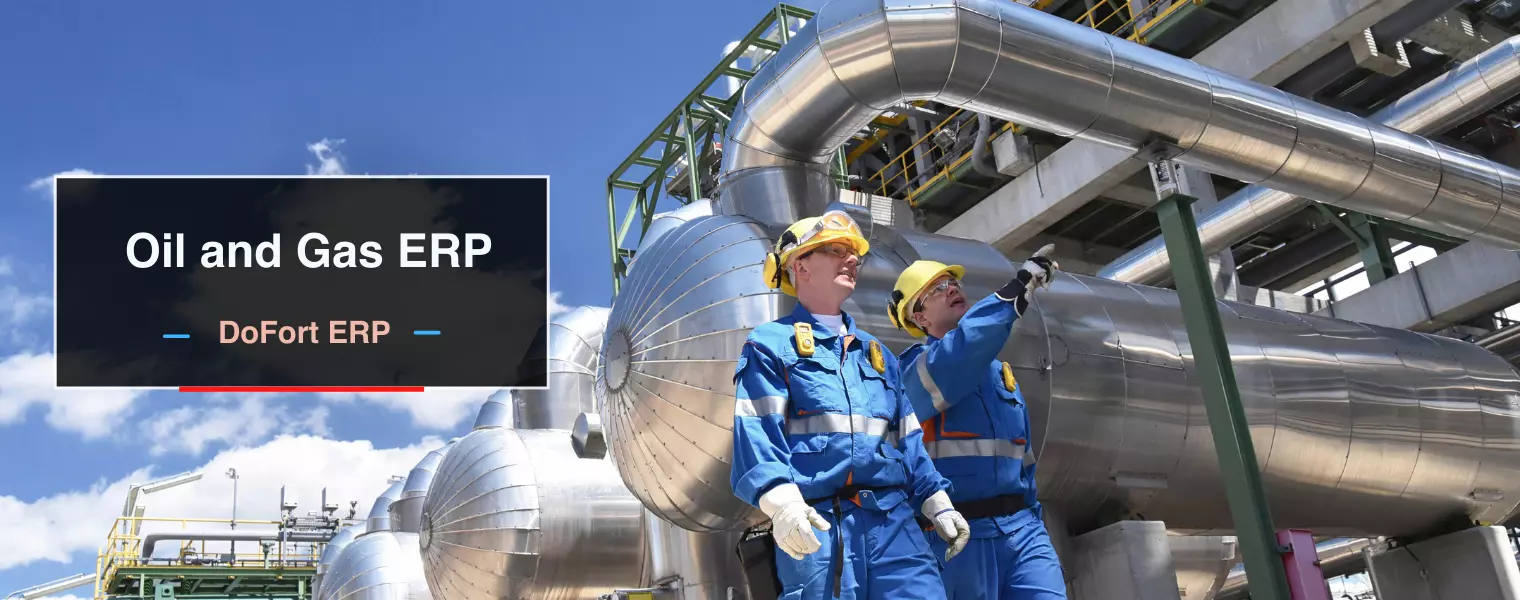
It's no secret that the oil and gas industry can be volatile at times. From rapidly changing regulations to fluctuations in international markets, oil and gas companies require enterprise software that is flexible, efficient, and adaptable to a changing regulatory landscape. Faced with these challenges, oil and gas producers must streamline processes, priorities company flexibility, and target all areas of waste.
ERP system like DoFort is the ideal platform for oil and gas businesses to stay competitive, because it promotes transparency throughout an organization. All departments can gain access to accurate, real-time information on company processes and results, which they can then use to drive decisions and allocate resources efficiently. However, not every ERP platform is capable of addressing the challenges that oil and gas companies frequently face. Here are four things your company should think about before deciding on ERP.
Companies in the energy sector conduct international operations and exchange services in a variety of currencies. As a result, your oil and gas ERP will necessitate a well-developed financial suite capable of handling a variety of legal entities for each geographical area. Once implemented and integrated into your business processes, it must be configured to docket, post, and audit multilingual content for complete financial compliance in separate regulatory environments. Providing a complete cost structure that includes direct and overhead costs for each job in multiple languages will allow your energy company to more securely control a global supply chain.
DoFort ERP contains global engines that are designed to manage international fiscal and compliance requirements. Its distinct Country Specific Functionality (CSF) supports global, regional, and local accounting and reporting standards such as IFRS and GAAP (GAAP). It also assists you in managing multiple currencies by keeping track of foreign exchange rate tables and automating buying and selling in an unlimited number of currencies. DoFort allows you to track fiscal performance across multiple locations while also managing complex accounting processes.
Energy companies operate with a diverse set of machines, vehicles, people, and other critical assets. Given the breadth of such a portfolio, oil and gas executives require their ERP to be capable of managing these assets in real time. Sensors built into critical machines and utilities must have their data captured and audited within the ERP system before being presented in an actionable format.
For example, if an energy company is required to perform regular maintenance at multiple sites for compliance reasons, project managers can use dashboards to see the geographic location, machine usage, and remaining useful life of an asset to ensure deliverables are completed and assets remain fully functional. Essentially, your ERP must be able to provide a high level of control over team members for the purposes of quality control and resource planning.
DoFort uses cutting-edge technology to provide users with a real-time view of asset performance. The Advanced MES module monitors downtime, temperatures, and other parameters to track your equipment from start to finish. With 24-hour visibility, you can get to the bottom of issues quickly. Furthermore, IoT technology provides automatic alerts of machine status and health to assist you in scheduling maintenance and avoiding unplanned downtime.
Any oil and gas ERP system should include a sophisticated engineering utility that is integrated with advanced Total Quality Management (TQM) functionality. Large-scale projects necessitate that energy companies be able to provide solutions for ETO, CTO, MTO, and MTS cases—all within a single ERP instance. The goal should be to deploy these on a large scale and track projects, phases, progress billing, engineering time, sales time, and other processes from start to finish. Energy companies will need to implement an ERP system that ensures strict quality control at every stage of the process.
DoFort comes with one of the most robust quality management modules available in the ERP market. With full traceability, you receive immediate notifications of malfunctions and other quality issues, allowing you to address issues as they arise. Complete audit trails and documentation make compliance easier, allowing you to avoid fines. DoFort's real-time visibility, automated workflows, and extensive tracking are designed to provide complete quality control without sacrificing efficiency.
It is more important than ever for oil and gas companies to implement a software integration platform to sync data across the various instances of their enterprise software architecture. Users can now share and review data from a single source in real time. This level of transparency will provide your company with a 360-degree, real-time view of operational costs at all levels of the organization. This information can then be used to make decisions and forecast demand for more efficient processes. Sales leaders, for example, can create demand forecasts within their CRM system, which instantly mirrors that information inside your ERP to assist engineering managers. Managers can then prepare capacity across multiple locations—all from within a single software suite!
Oil and gas companies must look for an ERP system that can be built around complex business processes and international standards. It should be able to integrate with other systems in order to streamline key information to project teams for planning and visibility of ongoing work. To support the oil and gas industry, DoFort ERP includes advanced tracking capabilities, IoT and MES features, global financial management, and more. For more info contact us at - info@doforttech.com or comment below.
Welcome to DoFort !